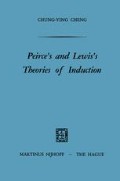Abstract
My study of Peirce’s theory of induction has shown that Peirce has made two justifications of induction, the probabilistic and non-probabilistic. By the probabilistic justification of induction, induction is shown to be a valid inference which consists in having a logical leading principle and drawing conclusions with probability. This justification of induction, as stated in Peirce’s own terms, as we have seen, is inadequate. But I have suggested the way in which Peirce’s argument can be mended. There are two conclusions which we may draw from this probabilistic justification of induction. First, we may say that there is always a logical and a priori-determinable relation between premises, which assure us of the existence of a fair sample with a given composition, and the inductive conclusion drawn from such premises. This relation we express by saying that the inductive conclusion follows with probability from its premises in accordance with a logical leading principle. It is wherein the validity of inductive inference consists. In other words, the validity of inductive inference consists in a probability relation between its conclusion and its premises.
Access this chapter
Tax calculation will be finalised at checkout
Purchases are for personal use only
Preview
Unable to display preview. Download preview PDF.
Reference
Of course, it is a question as to whether Lewis shares the same view on the nature of know-edge in his earlier book as in his later book. It is not the question which I am concerned with in this part of the book. Even if Lewis does not have the same thought in his later book, it makes no difference to my treatment of Lewis’ theory of induction, which is confined to part of Lewis’ ideas in Mind and the World-Order, and to part of his ideas in An Analysis of Knowledge and Valuation.
Author information
Authors and Affiliations
Rights and permissions
Copyright information
© 1969 Martinus Nijhoff, The Hague, Netherlands
About this chapter
Cite this chapter
Cheng, CY. (1969). Problems in Lewis’s Theory of Induction. In: Peirce’s and Lewis’s Theories of Induction. Springer, Dordrecht. https://doi.org/10.1007/978-94-011-9367-2_9
Download citation
DOI: https://doi.org/10.1007/978-94-011-9367-2_9
Publisher Name: Springer, Dordrecht
Print ISBN: 978-94-011-8598-1
Online ISBN: 978-94-011-9367-2
eBook Packages: Springer Book Archive

